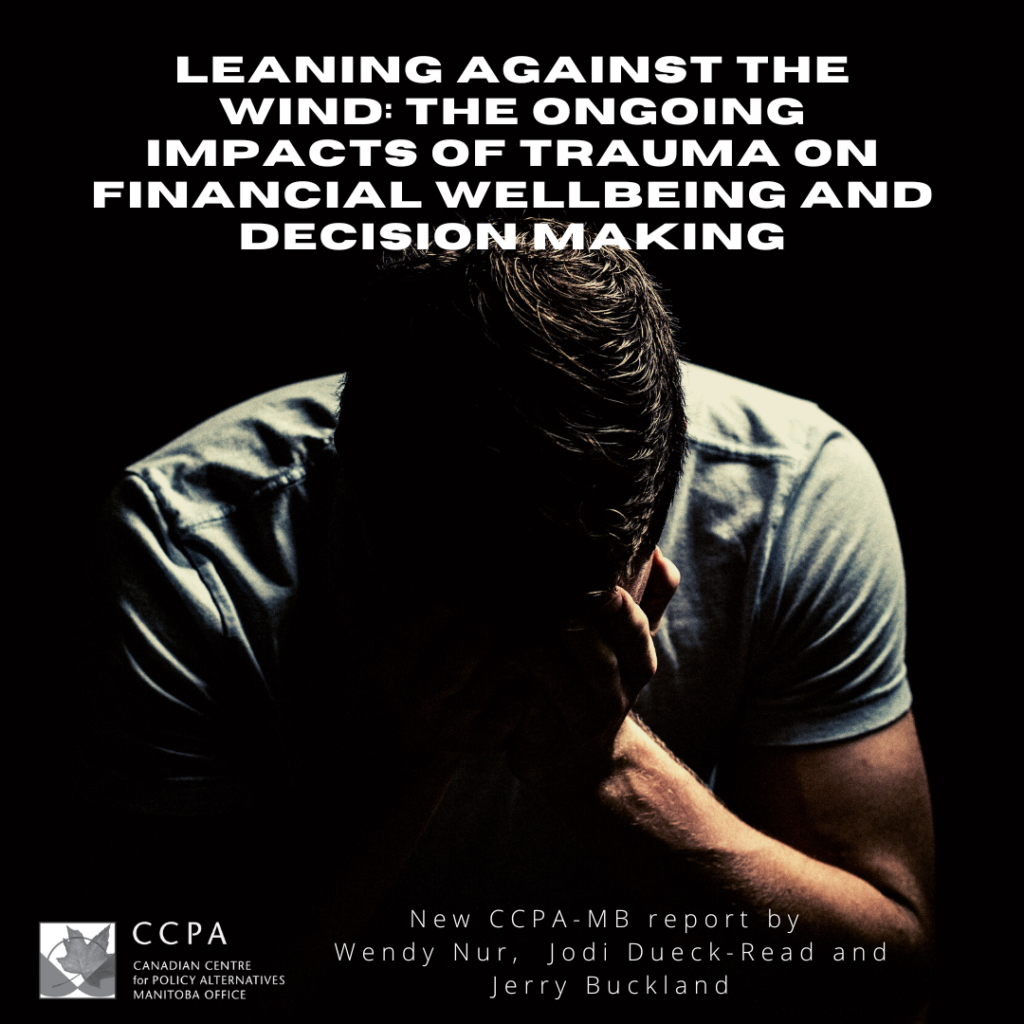October 4, 2022

Experiences of trauma prevent people from planning for financial future, finds new report
For Immediate Release (Treaty One, Winnipeg): A new report today finds that people who’ve experienced trauma are more likely to think short-term about improving their economic circumstances. The new report, “Leaning Against the Wind: The Ongoing Impacts of Trauma on Financial Wellbeing and Decision Making” is by Wendy Nur, Jodi Dueck-Reid and Jerry Buckland is published by the Canadian Centre for Policy Alternatives – Manitoba office.
This research is part of the Canadian Financial Diaries, a multi-year research project that uses a one-year financial diary process to look at the financial lives of participants. The research worked with 28 low-income and modest-income participants who documented their experiences with finances. This information was analyzed to identify common themes related to financial wellbeing. The research found that many participants’ finances were affected by past and current personal, interpersonal, and systemic trauma.
Trauma diminished people’s ability to focus on longer-term ways to boost financial wellbeing –such as job (re-)training, job search, building savings and credit– and instead, people were more focused on short-term needs. See stories below.
This research finds that job training and financial management support for low-income people who’ve experienced trauma must address their experiences of trauma to be successful. Trauma-informed financial interventions are more likely to address financial wellbeing and the barriers facing those who have experienced trauma. Such an approach provides opportunities to improve many aspects of wellbeing. The research also had some benefits to participants: a well-structured financial diary process, one that enables people to talk about, and share in a non-judgmental space their finances and life, can enable people to think about their finances.
Examples of stories of trauma and finances (names changed to protect confidentiality)
One diarist, Donna, had suffered relational trauma and at one point faced potential homelessness. She shared that she had drawn on her home equity line of credit to lend money to her children even though her limited resources were not adequate to sustain her daily needs and repayment of this loan. Another diarist, Jacquelyn, shared a pattern of one-sided lending to family members and had taken out a cell phone contract for a partner in her name; she was still paying for this contract although she had separated from her partner when she joined the project. Kateryna, who had a history of experiencing workplace harassment, was receiving Employment Insurance when she joined the project. She was also working under the table in what seemed like an exploitative relationship and faced an imminent income drop when her employment insurance ran out, yet she conveyed a present focus regarding her finances and did not have concrete plans. Nita experienced multiple traumas: child poverty and neglect; she was a Sixties Scoop survivor, and she lost a child to murder. Despite having a good income, she did not budget or save but consistently gave her finances, time, and energy to her adult children and grandchildren, which had negative personal and financial impacts on her. Namid, who struggled with addictions, shared about impulsive spending (on items such as alcohol and cab fare) at the beginning of the month and subsequently running out of funds.
Read the report: Leaning Against the Wind: The Ongoing Impacts of Trauma on Financial Wellbeing and Decision Making
About the Canadian Financial Diaries Project
The Canadian Financial Diaries is a multi-year project that seeks to capture the finances and financial experiences of low- and modest income earners in Canada. Using the financial diaries methodology, this research looks at both the barriers and opportunities which can impact financial well-being. Participants in this project meet regularly with researchers to share about their financial inflows and outflows and the values which inform their financial decision-making. This report reflects on some of the learnings from Phase One. The Canadian Financial Diaries project is currently in Phase Two, and meeting with a new set of diarists.
About the Authors
Jerry Buckland is a Professor of Economics based at Canadian Mennonite University and teaches International Development Studies at the University of Winnipeg.
Jodi Dueck-Read is an Assistant Professor of Conflict Resolution Studies and the Director of Practicum at Menno Simons College of Canadian Mennonite University. Conducting mixed methods interviews with the Canadian Financial Diaries, she learned new money tracking habits and enjoyed building relationships with participants.
Wendy Nur holds a BA in Conflict Resolution and is the Research Coordinator for the second phase of the diaries project.
About the CCPA
The Canadian Centre for Policy Alternatives is an independent, charitable research institute. All research is peer-reviewed.


